- Home
- Michael Dobbs
Winston's War
Winston's War Read online
Also by Michael Dobbs
WINSTON CHURCHILL NOVELS
Never Surrender
Churchill's Triumph
Churchill's Hour
THE TOM GOODFELLOWE SERIES
Goodfellowe MP
The Buddha of Brewer Street
Whispers of Betrayal
THE FRANCIS URQUHART TRILOGY
House of Cards
To Play the King
The Final Cut
OTHER TITLES
The Lords' Day
First Lady
© 2002, 2009 by Michael Dobbs
Cover and internal design © 2009 by Sourcebooks, Inc.
Cover photo © Corbis
Sourcebooks and the colophon are registered trademarks of Sourcebooks, Inc.
All rights reserved. No part of this book may be reproduced in any form or by any electronic or mechanical means including information storage and retrieval systems—except in the case of brief quotations embodied in critical articles or reviews—without permission in writing from its publisher, Sourcebooks, Inc.
This is a work of fiction. Apart from well-known historical figures and events, the names, characters, and incidents portrayed in it are the work of the author's imagination. Any resemblance to actual persons, living or dead, events or localities is entirely coincidental.
Published by Sourcebooks Landmark, an imprint of Sourcebooks, Inc. P.O. Box 4410, Naperville, Illinois 60567-4410 (630) 961-3900 Fax: (630) 961-2168 www.sourcebooks.com
Originally published in 2002 by HarperCollins Publishers
Library of Congress Cataloging-in-Publication Data
Dobbs, Michael
Winston's war : a novel of conspiracy / Michael Dobbs.
p. cm.
1. Churchill, Winston, Sir, 1874-1965—Fiction. 2. World War, 1939-1945—Great Britain—Fiction. 3. Burgess, Guy, 1911-1963—Fiction. 4. Prime ministers—Fiction. 5. Large type books. [1. Great Britain—History—George VI, 1936-1952—Fiction.] I. Title.
PR6054.O23W56 2009
823'.914—dc22
2008045838
FOR SANDY AND EDNA SAUNDERS,
AND EDNA DICKINSON.
Much loved aunts and uncle.
Contents
Author's Note
Part One
One
Two
Three
Four
Five
Six
Seven
Part Two
Eight
Nine
Ten
Eleven
Twelve
Thirteen
Part Three
Fourteen
Fifteen
Sixteen
Seventeen
Eighteen
Nineteen
Twenty
Twenty One
Twenty Two
Twenty Three
Epilogue
Acknowledgments
Reading Group Guide
About the Author
This is unashamedly a novel, not a work of history. Yet if it inspires its readers to dig more deeply into the events and personalities of that extraordinary time, and to decide for themselves not only what happened but why things happened, then both the truth and Mr. Churchill will have been well served.
MD, May 2003
How horrible, fantastic, incredible it is that we should be digging trenches and trying on gas masks here because of a quarrel in a faraway country between people of whom we know nothing.
NEVILLE CHAMBERLAIN, speaking about Czechoslovakia, hours before flying to Munich to negotiate the deal with Hitler that surrendered to Germany large parts of Czechoslovakia. The Czechs were not invited to the negotiations.
PART ONE
BLESSED ARE THE
PEACEMAKERS
London, Saturday, October 1, 1938.
A story has to start somewhere. Ours begins on a disgruntled day in autumn, in the unsuspecting year of 1938.
It could have begun a generation earlier, of course—in 1914, as the British Expeditionary Force whistled its way off to war with the Kaiser. Or 1918, when the few that were left dragged themselves back. There again, we could have started a century earlier when the hooves of the Emperor Napoleon's cavalry turned the continent of Europe into a muddy dying place that stretched from the tumbling rivers and mountains of Spain to the gates of imperial Moscow. Extend the imagination just a little and we could go back—why, a thousand years, to that day on a hill overlooking the coast of Sussex when King Harold raised his eyes to view his enemy in full retreat, and got nothing but an arrow for his efforts—or another thousand years still, to the time of the great Julius and his invasion fleet as they landed a little further along the shore. We could go back to almost any day, in fact, and still it would be the same. Johnny Foreigner was a pain.
But this story starts on the Bayswater Road, and not with a King or an invading Emperor but an undersized figure named McFadden. He is a gentlemen's barber, and a good one. One of the best, in fact. A man with a sharp eye for detail and a soft hand, a punctilious sort of fellow both by his nature and by his trade. Yet McFadden is late, which is unusual for him. And he shouldn't be late, not today, for this is the day he has agreed to be married.
He has dressed as best he can in the circumstances, but it doesn't quite work. The heavy wool jacket is meant for someone at least ten pounds lighter and the button at his belly keeps coming undone. The rose in his buttonhole also refuses to cooperate. It has slipped away from its pin and is threatening to jump. McFadden mutters a dark spell under his breath and makes running repairs, hastening on his way, which isn't easy with his pronounced limp. We haven't mentioned his limp, but he has something badly wrong with his hips, which are out of line, and when he hurries he has to swivel his entire body in order to propel his right leg forward. So McFadden never likes to hurry. This isn't working out as he had hoped.
He had planned to make the journey by underground train from his home near the Piggeries in North Kensington to the register office at Caxton Hall, but when he turned up at the station he found nothing but an untidy notice pasted on the gates—"closed for urgent structural repairs.” A minor deception, so far as official pronouncements went. The whole of London knows the truth. The station roofs are being reinforced so they can be used as bomb shelters.
Ah, but there isn't going to be any bombing.
They have the Prime Minister's word on that. He has flown back from Munich just the day before to announce that he has brought with him “peace with honor, peace for our time.” Mac doesn't believe him, of course. Another cholemi, goddamn lie. Ever since the mohel had turned him over on the kitchen table and assured him that it wouldn't hurt, moments before cutting the end off his prick, he has known that the System always lies. (Not that he can remember anything about his circumcision, of course, but his elder brothers Yulek and Vovek never spared him the more gruesome details. He had screamed for hours afterwards.) Mac knows about lies. Lies have followed him like a shadow wherever he has gone and were usually there to greet him when he arrived—in Poland, in Germany, and particularly all those years in Russia. Now he is in England, and the only difference in Mac's mind between Mr. Neville Chamberlain and the psychopath Stalin is that the Englishman went to a proper school and has learned not to scratch his balls in public—although, come to think of it, Mac has never seen photographs of Stalin holding his own umbrella, there is that difference, too.
His leg is hurting like hell. It's always giving him gyp—he can't remember a time when the bloody thing wasn't on fire—and the damper it gets the more it burns, deep inside, right to the marrow of the bone. So Mac decides to take a shortcut across the park. Not one of his better decisions. The flat expanse of Hyde Park is usually serene and calm,
but something has happened. Instead of green acres, Mac is greeted by a bubbling chaos of mud. Like Judgment Day. On all sides the earth has been torn open where workmen with pickaxes and mechanical shovels have hacked a chaotic maze of holes into the thick London clay. Trenches everywhere. “Air Raids—Public—For The Use Of"—hah! These bloody holes can't offer protection from the rain let alone from fat Goering's bombs. They aren't finished and already they've begun to fill with water, sullen and brown. Typical English idiocy. Treating war like a game of cricket. Something to be called off if it rains. Tzibeleh! They grow like onions, these English, with their heads stuck firmly in the earth.
The spoil from the newly dug graves is beginning to cling to Mac's shoes and find its way onto the legs of his trousers, even though the trousers, like the jacket, are conspicuously short. That's why they had been cheap, from the pawnbrokers on the Portobello. It's his only suit. And the rose in its lapel is wobbling once more.
McFadden isn't his real name, of course. Jewish boys born in Poland just before the turn of the century had names like Kleinman and Dubner and Goldberg. He'd been born in the small market town of Wadowice at the foot of the Carpathian mountains, in an airless upstairs room next to the women's ritual bathhouse and on a hot summer's day that had hung heavy with the dust from the harvest. He was one of six children and had been nothing more obvious than a schoolboy who spent his spare evenings as a part-time tailor's assistant, someone who was of no interest to anyone other than his parents, but that was before they had decided that they needed a new type of System in Europe and tore the old one apart. Mac had belonged to a small class of friends, eighteen in total, and every one of them had been swept up in the madness, conscripted, forced to fight for the Kaiser as part of Auffenberg's Fourth Army. But the Fourth Army had lasted only weeks and Mac's unit had been cut to pieces in front of the river town of Jaroslaw. Literally, cut to pieces. It was amazing how high a boy's screams could rise more than a year after his voice had broken. But still Mac hadn't escaped the System, for those few of his class who remained alive had been captured and questioned, then stood against a crumbling farmyard wall beside a filthy chicken coop and told they had a choice. The System was giving them a choice! Either they could fight for the Tsar or, if they preferred, they could be shot. Not much of a choice when you're still a few months short of your seventeenth birthday. So for the remainder of that awful year they had fought for the Russians against their old German comrades until the Revolution had come to rescue them from the madness and at last Mac had been able to throw away his rifle. But by then only he and Moniek, the doctor's son, were left. Still, they were alive, they felt special and they rejoiced. It was the last time Mac could remember being happy.
He had celebrated the peace along with all the other soldiers, until the Bolsheviks had discovered that he and Moniek weren't Russian at all and so didn't fit into the Brave New System and its world of miracles. They knew it was truly a world of miracles, not only because the guys with the boots and rifle butts told them so but because their rabbi had always taught them that miracles would be beyond their comprehension. And nothing made sense any more. It was important in this new world to be internationalists, they were told, but apparently it was more important still to be Russians. Which they weren't. So the angels with the boots and the rifle butts placed them once more in the service of the System and sent them off to labor camps, the gulags—Kolyma, Knyazh-Pogost, Sretenka, Yertsovo, Pomozdino, Shchelya-Yur, Solikamsk. An endless world of little miracles, often at thirty degrees below, filled with angels who in the morning would scream instructions—"anyone unconscious come out now or be left behind to freeze!"—and saints who refused to distinguish between the living and the dead. They were all expected to work. They were herded from camp to camp, crammed into a metal-sided Stolypin rail carriage with room for twelve but often stuffed with thirty or thirty-five for days and even weeks on end. Mac remembered one carriage so filled with prisoners that for three days his feet hadn't touched the floor. He had remained suspended between earth and heaven, hovering on angel's wings, fighting for every breath, until an inspection had allowed them to sort the dead from the slowly dying and lay them on the floor of the carriage so that those who were left could complete the journey standing on the bodies. Pleas to offload the corpses were received with nothing but a beating. The paperwork had said that the Stolypin had started its journey with so many bodies, so that's how many it must finish with. The journey lasted fifteen days.
Another time he had been thrown into a carriage of women, mostly withered old veterans but one or two with flesh still clinging to their bodies and so closely crowded that he'd had a continuous if inevitably crude form of sex with one of the younger ones for the best part of a week. It was his first time. Oh, what a lot he owed to this new world of miracles.
And so it went on, and on, and on, half starved then half beaten to death until their existence had been entirely forgotten and their names and origins wiped from any record. Nothing but entries on a transit sheet. Then, around the year of 1920—who could be sure, time meant nothing, only suffering and food had meaning—he and little Moniek had found themselves in the gulag by the sea. Camp No. 3, Fourth Compound, Solovetsky Islands. On the other side of the world above the Arctic Circle. Intended for three hundred but housing more than four and a half thousand. The camp had grown and grown—another miracle. Only the number of latrine buckets had remained the same.
And Mac remembers, relives it all, no matter how hard he tries to obliterate it from his mind.
Moniek has almost died of fever on the endless journey. Mac drags him semiconscious and rambling from the prison ship that has taken them there from Archangel, but there is no respite. Within hours of arriving they are set to work on the new harbor. Moniek, feverish, rambling in his mind, has never seen the sea before. The gently swelling water seems to him to be the new world he has been dreaming of, peaceful, embracing, infinite. He gives a quiet hurrah of joy, then begins to stumble into the surf. He doesn't seem to notice that it's barely above freezing. Now he turns around, he's looking back like a guilty child, but the guards are laughing and waving him on—fish bait, they shout, go drink the ocean dry—and ignore him as Moniek struggles away from the shoreline, until all that can be seen of him is the back of his dark head bobbing in the distant swell.
That's when the guards decided to lay a few bets as to which of them could give little Moniek a proper parting. A difficult job in the swell, but the fifth bullet had taken off the top of Moniek's head like a ripe gooseberry.
It's strange what a persecuted mind will do, how it tries to protect itself. Mac would always remember Moniek, but when he had finally found his way out of the gulags and obtained passage on a ship bound for anywhere, he couldn't remember his own name. It had gone. Somehow the System had swallowed it up, robbed him of his identity, left him as nothing more than a number. When the ship eventually docked at a place called Tilbury, the official of yet another mamzer System had demanded a name from him—didn't seem to care which—so he had called himself McFadden, after the ship's captain. A good, stout, non-Jewish name.
And it's what he still calls himself all these years later. He has long ago learned that being Jewish in this world is an invitation to a beating, or worse—even here in London. It's not so much that he has forgotten he is Jewish, simply that he's put it behind him, like taking off an old coat. Things are so much easier that way.
Now there is to be a Mrs. McFadden. She is a shiksa, not kosher, but pleasant enough, a widow several years older than he who has been left with her own modest ground-floor apartment in West Hampstead and a desire which borders on the desperate to be married once more. “It could be war at any moment,” she says, “and by then it might be too late.” She's right. So Mac has agreed, not because he loves her but for no more solid reason than that he doesn't want to disappoint her. Anyway, as she says, if war breaks out London will be bombed and gassed until nothing is left, so it doesn't make any bloody
difference.
But—miracle of miracles—there isn't going to be a war!
Chamberlain has come back from his mission to Hitler waving a little bit of paper “which bears his name upon it as well as mine” and which promises peace, all in exchange for a chunk of an unfamiliar, faraway land which belongs to someone else. The world has gone quite mad. They believe Hitler. But Mac knows better. He knows dictators, knows the System, knows that the only signature you can trust is the signature they put on a death warrant or transportation order. He sighs. His leg feels as if it's burning to the bone and the mud beneath his feet is now clinging, treacherous. He stoops to grab a sheet of wind-thrown newspaper to wipe the mess from his shoes. The page carries a huge photograph of Chamberlain back from his dealings in Munich and standing triumphant alongside the King and Queen on the balcony of Buckingham Palace. Everything is floodlit, like a huge stage, and the crowd below is almost hysterical with relief and gratitude. Mac scrapes the mud from his feet and wonders if they are celebrating in Prague, too.
But maybe they are right. Perhaps there isn't going to be a war—in which case he and Mrs. McFadden will most certainly repent their marital rashness at leisure. But his nose tells him that war can't be far off, he can smell it, in which case—what's the point? Of hurrying? Of marriage? Of anything?
In the corner of the park he can see the crew of an anti-aircraft gun at their training. They seem to be making a hash of it, judging by the exasperated voice of their instructor. It's rumored there are fewer than a hundred of these guns to defend the entire capital—no wonder they're praying there isn't going to be a war. But Mac has long since lost any belief in a god. The rain has started again and the mud is back on his shoes, the damp worming its way through the welts. He pushes his aching body forward once more, head bowed, like the slave he once was. As he does so the flower in his buttonhole finally makes its escape and drops back to earth. “Pshakrev!” He curses and throws away the soiled newspaper in disgust.

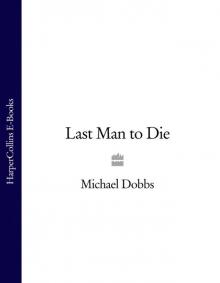 Last Man to Die
Last Man to Die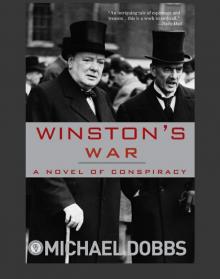 Winston's War
Winston's War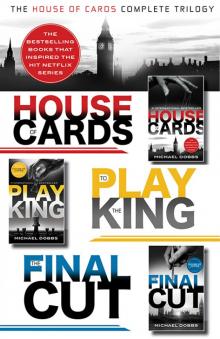 The House of Cards Complete Trilogy
The House of Cards Complete Trilogy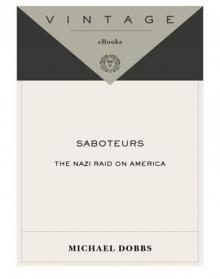 Saboteurs
Saboteurs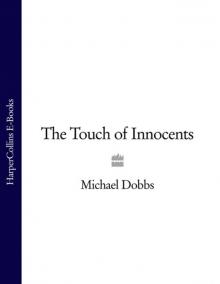 The Touch of Innocents
The Touch of Innocents WC02 - Never Surrender
WC02 - Never Surrender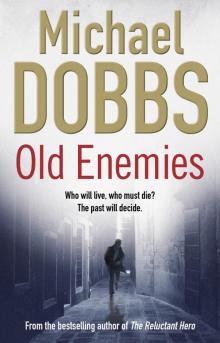 Old Enemies
Old Enemies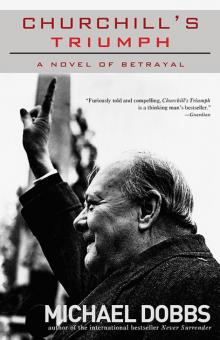 Churchill's Triumph
Churchill's Triumph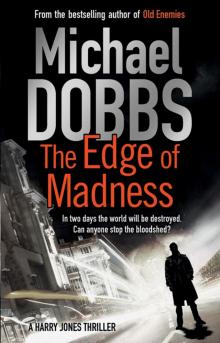 The Edge of Madness
The Edge of Madness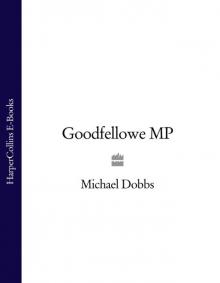 Goodfellowe MP
Goodfellowe MP The Final Cut
The Final Cut Whispers of Betrayal
Whispers of Betrayal Churchill's Hour
Churchill's Hour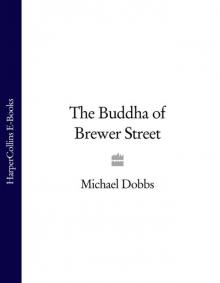 The Buddha of Brewer Street
The Buddha of Brewer Street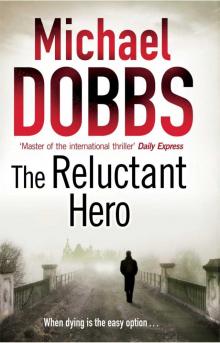 The Reluctant Hero
The Reluctant Hero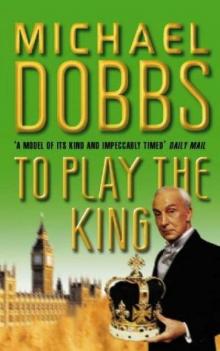 To Play the King
To Play the King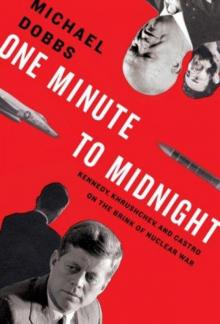 One minute to midnight
One minute to midnight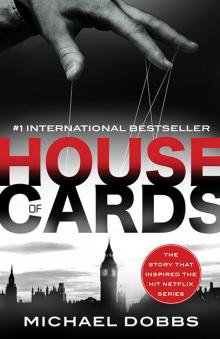 House of Cards
House of Cards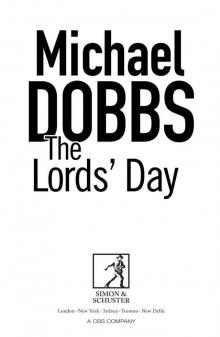 The Lords' Day (retail)
The Lords' Day (retail)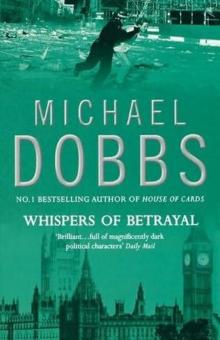 Whispers of betrayal tg-3
Whispers of betrayal tg-3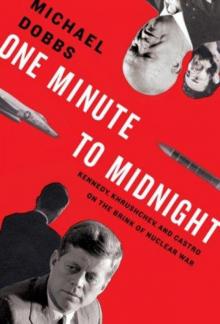 One minute to midnight: Kennedy, Khrushchev, and Castro on the brink of nuclear war
One minute to midnight: Kennedy, Khrushchev, and Castro on the brink of nuclear war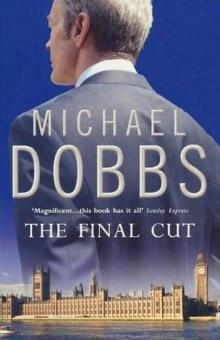 The Final Cut fu-3
The Final Cut fu-3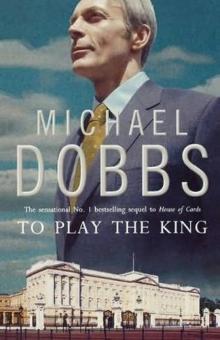 To play the king fu-2
To play the king fu-2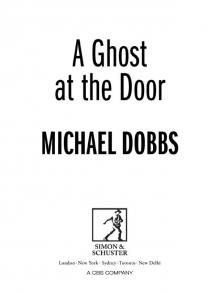 A Ghost at the Door
A Ghost at the Door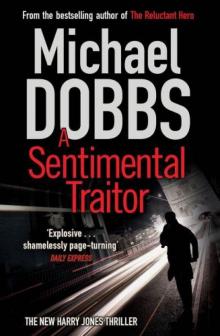 A Sentimental Traitor
A Sentimental Traitor